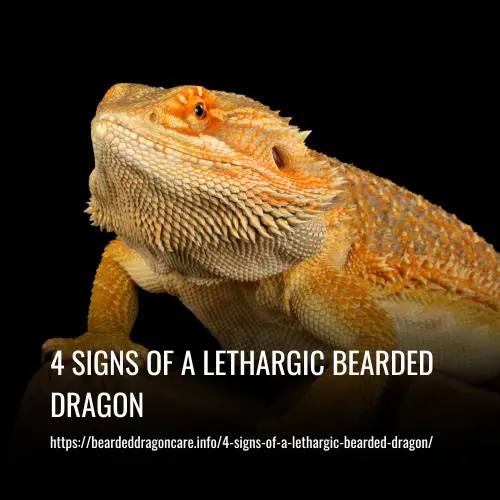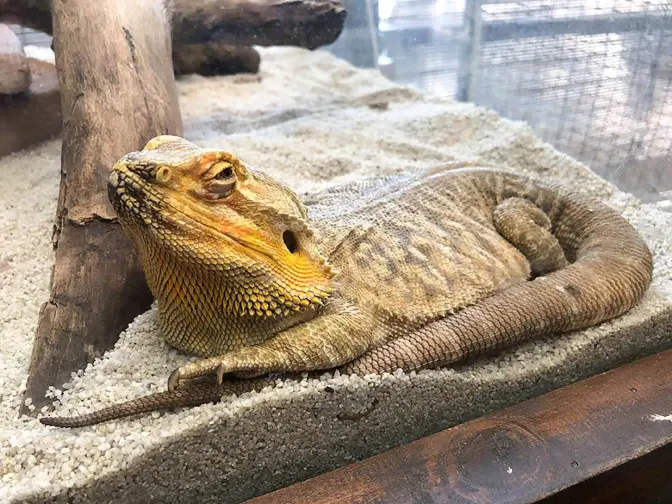Signs of a Lethargic Bearded Dragon: 4 Signs & What to Do
This post contains affiliate links. As an Amazon Associate, we earn from qualifying purchases.
Bearded dragons are usually full of energy; running around their habitat, chasing insects, and soaking up the sun. But sometimes, a bearded dragon can become lethargic, leaving owners concerned about their pet’s health.
If your bearded dragon starts to slow down and no longer enjoys activities it used to love, it could be a sign that something is wrong. So how can you tell if your scaly friend is feeling unwell or just taking a nap?
In this article, I’ll discuss the 4 signs of a lethargic bearded dragon and give some advice on what to do if you think your lizard may be feeling under the weather.

4 Signs of a Lethargic Bearded Dragon
Medically, lethargy is a disease state of sleepiness or unresponsiveness and inactivity. Generally, lethargy is a lack of energy and enthusiasm. Irrespective of the reason, lethargy in pet Bearded dragons is an indication that something is wrong.
A healthy Bearded dragon is bright, alert, and almost always willing to eat. Here are the 4 signs of a lethargic Bearded dragon:
- Unwillingness to eat
- Lying down and unable to use the legs
- Staying in one place most of the time
- Closed eyes and unaware of the surroundings
Greater concerns should be raised when a combination of the above-mentioned signs is observed. Also, see the causes of a lethargic Bearded dragon for more information.
Unwillingness to Eat
Bearded dragons are considered good eaters and, on average, should be interested in at least one meal a day. Although a little bit more tricky to judge in babies and newcomers, it becomes obvious when a strong Bearded dragon suddenly stops eating. Lethargy in Bearded dragons will be more likely when this behavior continues for a period of days.
Lying Down and Unable to Use the Legs
Healthy Bearded dragons are able to use their legs to lift their bodies off the ground. Their heads are also easily lifted into the air. A lethargic Bearded dragon is too weak to support its head and body.
A lethargic Bearded dragon is very often not able to lift its body from the ground.
Staying in One Place Most of the Time
It is very often a sign of weakness when a Bearded dragon is not moving around much and/or is staying in the same place for long periods. When given a gentle push, most Bearded dragons should respond by moving away. Refusing to, or being unable to, should cause great concern.
Closed Eyes and Unaware of the Surroundings
It is natural for Bearded dragons to sleep at night and in colder temperatures. Sleepiness is also less of a concern after a meal or activity. It is abnormal when a Bearded dragon is asleep most of the time.
Why Would a Bearded Dragon Be Lethargic
A bearded dragon may become lethargic due to several possible causes. Firstly, it could be related to their diet. If your bearded dragon isn’t getting the nutrition that it needs, it can result in a lack of energy and make them appear sluggish or slow.
Another potential cause is an improper habitat. It’s important that you provide your bearded dragon with an environment that replicates its natural habitat, as different temperatures can stimulate its activity levels. Low temperatures in particular can lead to feelings of drowsiness and sluggishness.
Finally, internal parasites may be lurking within your bearded dragon’s body which can cause lethargy. Since these issues go beyond the surface level, it would be best to have a qualified veterinarian check out your pet if you think it may be sick or fatigued too often.

What to Do if Your Bearded Dragon is Lethargic
If you notice that your Bearded dragon is acting lethargic, it is likely due to a lack of proper exposure to UV rays. This type of light source helps the Bearded dragons properly digest and absorb food and nutrients, therefore if they don’t have enough access to this light, their energy levels can become low.
To prevent your Beardie from becoming lethargic, make sure to provide them with plenty of UV rays. The basking bulb should be on for a duration of 12 hours and be positioned approximately 12 inches above the basking area. This will help ensure your furry friend gets all the nutrients they need every day to remain healthy and active.
In addition to providing your Beardie with proper lighting though, try offering different foods such as vegetables or insects as well as using stimulating activities in their environment such as hideouts or climbing materials. All these activities are important for keeping their mind sharp and helping them stay alert throughout the day.
Conclusion
In conclusion, a lethargic Bearded dragon can cause concern for owners. However, if you recognize and understand the signs, you’ll be able to identify the problem and prevent it from getting worse.
By regularly monitoring your pet’s eating habits and providing good nutrition, plenty of room for exercise, and regular socialization activities with you or other suitable pets in the home, your Bearded dragon will remain as healthy and active as ever.
So keep an eye on your scaly friend, take action when necessary, and enjoy a lifetime of reptilian bonding!
